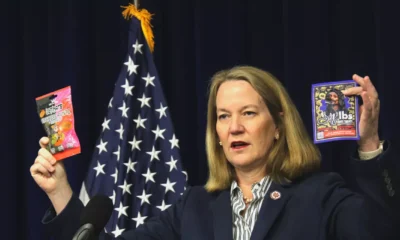Aaron Gunches
Legal Battle Erupts Over Arizona’s Lethal Injection Drug Practices

Arizona’s execution protocol, which mandates lethal injection, is under scrutiny as legal challenges mount regarding potential violations of state and federal laws. This scrutiny arises in the context of Aaron Gunches, who, after spending over two decades on death row for a 2002 murder, is seeking execution.
Gunches has requested to be executed, a procedure to which the Arizona government appears poised to comply. The Arizona Supreme Court is set to review the state’s request for a death warrant on February 11, with execution potentially scheduled for March 18 if granted.
Recently, three amicus briefs were submitted, advocating against Gunches’ execution, particularly concerning the source of the lethal drugs stored in an unmarked refrigerator since 2020. One brief represents 22 medical professionals, including former U.S. Food and Drug Administration (FDA) commissioners, while another includes 16 inmates from Arizona’s death row whose fates may be determined by the court’s ruling on Gunches.
Both briefs assert that the execution plan would contravene multiple drug laws, thereby raising significant legal and ethical concerns. Despite these challenges, Arizona maintains a strict policy of confidentiality regarding execution details, including the identity of executioners and drug sources.
Previous reports have indicated that pentobarbital, the drug utilized in Arizona’s lethal injections, can result in agonizing deaths, potentially through a process termed “flash pulmonary edema.” This phenomenon potentially causes the lungs to fill with fluid, leading to a painful experience for the inmate.
Legalities surrounding the procurement and use of death penalty drugs have been contentious. Historical precedents reveal a complex relationship between states like Arizona and pharmaceutical regulations, especially following a 2010 exposé on the circumvention of drug laws.
In 2019, amid increasing scrutiny, the U.S. Department of Justice ruled that the FDA lacked jurisdiction over execution drugs. Nevertheless, a subsequent court ruling in 2020 contradicted this position, necessitating prescriptions for lethal drugs and classifying the solitary use of pentobarbital as potentially cruel and unusual punishment, according to the Eighth Amendment.
In late 2023, newly appointed Governor Katie Hobbs assigned former federal magistrate judge David Duncan to examine lethal injection protocols. However, his dismissal raised questions regarding the ongoing oversight of the drugs and procedures used in executions.
Concerns persist regarding the legality and safety of the drugs employed in Gunches’ proposed execution. Attorney Gregory Iannelli, representing the medical professionals, highlighted that these drugs were obtained from an unregulated facility, potentially violating multiple federal standards.
Moreover, Iannelli pointed out that Arizona’s state law forbids compounding pharmacies from producing substances intended to cause death. This raises serious questions about the integrity of the drugs being used.
In light of these challenges, Gunches’ legal team and advocacy groups argue that the execution should not proceed, citing a lack of reliable testing methods for the drugs intended for use. They warn that without stringent oversight, the potential for drug misuse is alarmingly high.
In its response to the amicus briefs, the state leaned on past legal opinions asserting its authority to proceed with Gunches’ execution. Authorities argue that the necessary legal criteria for execution have been met, thereby dismissing the claims made in the briefs as devoid of merit.


















